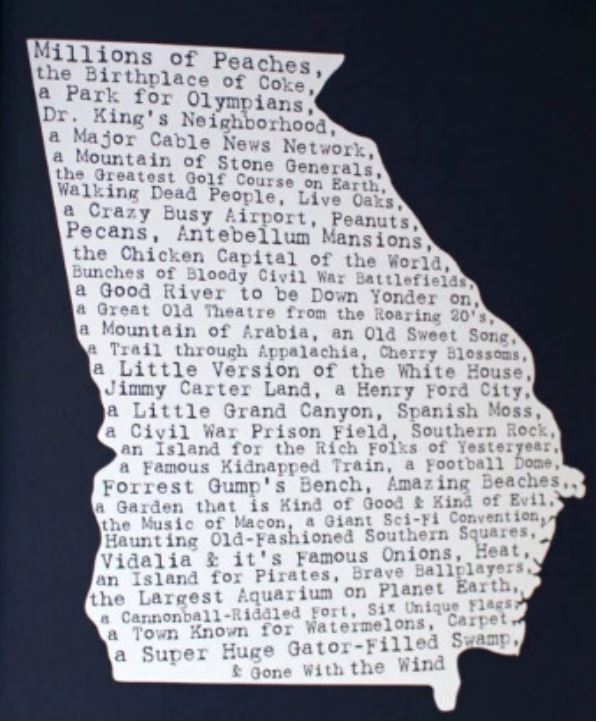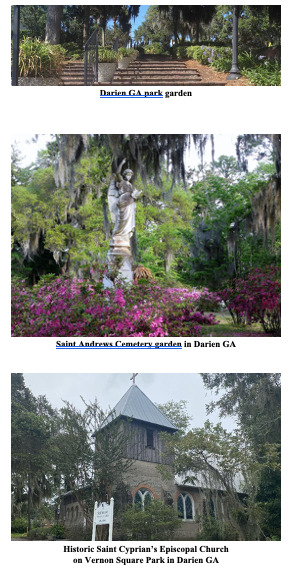Life & Island Times: A Nutshell of First Impressions
Editor’s Note: Something caused Marlow and the writer’s Section to delve into a past that developed us all this morning. Independent, yet sharing a time of motion and wonder at all that is around us veteran’s of what we called “The American Century.”
– Vic
Author’s note: A little over five years ago upon our final approach to the Hostess City to move into our recently purchased, 19th century home near Forsyth Park, first impressions started forming of our new coastal Georgia homeland.

We chose not to detour to St. Simons Island, Sea Island, or Jekyll Island — that would have required several additional days. Consequently, we meandered past old military fortifications, over countless rivers, and across vast salt marshes.
The landscape really was what a long-ago Scottish nobleman called them — “Golden Islands,” since the hue of the marsh grass seemed to soften and glow as dusk settled.
While the above phrases capture America’s well know impressions of the state of Georgia in a nutshell, this Costal nutshell requires more words for this jumbled assemblage of memories.
-Marlow
A Nutshell of First Impressions
As we drove two cars and pulled one U-Haul flatbed trailer northward on two-lane, double- and triple-digit state routes, we looked closely at the small Southern towns of coastal Georgia. It was before dusk’s approaching half-light, and we saw cotton farms, pine woods, the marsh farm field draining canals that crisscrossed what locals call the Coastal Empire. The occasional small county courthouse squares along our route were dotted with still opened but repurposed stores and long-closed offices and businesses which comprised and shaped these settlements’ past.
In this early part of the 21st century we started observing the life the area knew. It wasn’t a very big world, but neither were its population numbers. Most drivers didn’t see it, preferring to speed along at 80 MPH on the American interstate octopus I-95 tentacle while trying to avoid being stultified by its soul sucking emptiness.
This coastal region was approaching its 300th birthday of its earliest English immigrant habitation.
Some might say that the area was hot, tired, and old then, and, accordingly, its people did seem to move slowly. There was no hurry for there was nowhere to go, nothing to buy, and no money to buy it with.
Upon entering the Peach State, we saw folks gently backing their cars out onto the highway. These vehicles were one-and-all older cars, not clean or waxed, but, outside of worn tires and some tailpipe smoke, for the most part roadworthy. Now and then when they were in town, they’d slow down, roll down a window and call out of the window at someone they knew on the sidewalk. Further decelerating, more words were exchanged, and then without warning their journey would suddenly recommence.
We concluded that once we were out of town and in the country, things would speed up. For the most part they did.
This was a bit tiring at first, but we got used to it and went with the flow.
The houses were small framed, built high off the ground and with porches in the manner of Southern cottages of their various eras. Yard sizes varied, but the larger ones were filled with huge, gnarled live oaks with resurrection ferns covering their main branches. Many of these dwellings possessed an air of mystery about them in the waning light.
Raw boned, red-callous handed people of modest means here still paid their debts slowly over time with what they could scrape up — fish freshly caught, apples and peaches picked, nuts and veggies harvested. Kids still climbed trees, swam in cricks, did chores, and mam’d and sir’d every adult. They wore worn denim pants and hand-me-down short sleeved cotton shirts.
At the end of each month when money was tight, neighbors shared recent newspapers and magazines, coffee grounds and tea bags, leftovers to make it to the new month’s checks while good-morning’ing each other without fail.
No one wanted to needlessly bother others none with their problems and needs. So, small talk was scarce.
Were they poor?
Many were, indeed.
These were small towners, country folks, farmers and retail clerks on the bottom rung of our country’s economy, and the recent housing and financial crashes had hit them the hardest.
To put a fine point on this, many homes’ back and front screen doors were their air conditioning during summer’s hot humid months.
This kind of life aged the young ones with many possessed of serious looking little faces. When waved at, their scowls would disappear and fleeting smiles would brighten their faces, as they politely waved back.
They looked like they only played tackle football. Tough, with a will so airtight, no one could break it. They learned early on to count their blessings and stop complaining. They still knew what the phrase lucky stars meant and thanked them daily for what they had.
Unlike their bigger city peers, they had the sense to act their age or older.
They were amazingly admirable throwbacks.
Behind their solemn, owlish faces they were knowledgeable and imaginative creatures from a bygone era.
Diet made many of them a bit on the puny or lanky side.
Yes, they were on the small side, but older, respectful, and self-reliant — in my mind they were all blue-ribbon award winners in any Beautiful Child contest they might enter.
The mature, healthy-looking adults appeared thick bodied and accustomed to strenuous labor.
Now and then we’d spot older, regal-looking, austere men and women on sidewalks and porches. If we made eye contact with them, they became very subdued, perhaps afraid to admit their shortchained-life circumstances. They would not return our outward respectful signals, like touching a hat brim or a slight head bow, and sped up their sliding, scuffling and shuffling feet along the sidewalk out of our view.
Sometimes as we exited a village, in the receding distance behind us we’d hear a town clock strike. We wondered how they kept such an extravagance operational. More than likely its operations and maintenance were continuing acts of love for time and the heartfelt place. They’d never let their mechanical chiming hourglasses run down and out, we thought.
We were delighted at no matter how humble these worn Main Street homes were that they always had trimmed local flowering bushes and trees. While planted long ago during more prosperous times, these camellias, azaleas, crepe myrtles and magnolias to name a few made a very positive impression on residents and passersby.
Even the renown Georgia botanical gardens of Callaway did not outshine these flowered displays. These show place efforts said that the show down here in this narrow slice of the South must always go on as we saw older residents working in their colorful yards as the cooling evening air temps descended.
These towns and people were more than just nice. They had seen better, lovelier times, but still kept up their appearances, since those beauties gave them joy, connection to those who had passed, and hope for a lovelier future that might come. They still loved this, their place, each other, and their life. These places loved them back.
As night fell down hard upon us, we finally entered our new border town city by the river and went straight to sleep on an air mattress after almost 700 miles of hard driving in a single day.
The first thing we set up the next morning when the moving vans showed up was our cushioned wooden glider bench on the porch so we could listen to the murmurs of the townspeople at night, chat with passersby during the morning and greet more of our new hometown rhythms, scents and sounds as well as its folks. Not just neighbors and shopkeepers but also its idlers and dreamers, who sit lounging under oak and maple trees. We swore oaths to sharpen and focus our eagle eye skills on whatever happened on the streets, sidewalks, parks, and squares.
Watching, observing, listening, and assessing but also imagining the unseen behind-the-scenes things would be on our agendas.
We committed to pause, listening and watching in silence. It was what Southerners did. Or should do, especially and, in particular, if these newcomers were Yankees like us.
Along the Ocean Highway — one small town’s images

PS You never really understand a people and a place until you consider things from their point of view — sorta like climbing into their skin and walking around in it.
This way of living and learning quickly became second nature as time passed.
Copyright © 2021 From My Isle Seat
www.vicsocotra.com
